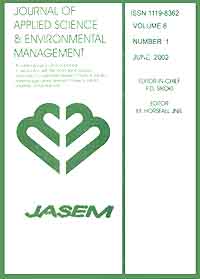
|
Journal of Applied Sciences and Environmental Management
World Bank assisted National Agricultural Research Project (NARP) - University of Port Harcourt
ISSN: 1119-8362
Vol. 15, No. 2, 2011, pp. 361-364
|
 Bioline Code: ja11062
Bioline Code: ja11062
Full paper language: English
Document type: Case Report
Document available free of charge
|
|
|
Journal of Applied Sciences and Environmental Management, Vol. 15, No. 2, 2011, pp. 361-364
| en |
Geo-electrical investigation of Leachate Impact on Groundwater: A Case Study of Ile- Epo Dumpsite, Lagos, Nigeria
ADEOTI, L; OLADELE, S & OGUNLANA, F O
Abstract
In the past few decades, disposal sites have been filled with household refuse and different kinds of potentially dangerous industrial waste in an uncontrolled manner which poses an enormous risk for the environment, and are the main sources for groundwater contamination. With the aim of assessing impact of leachate on the underlying aquifers by determining and delineating possible leachate infiltration into the aquifer matrix ,Constant Spacing Traversing (CST) was carried out using Wenner array and spacing between 10-60 m along four 160 m – 180 m profiles. The results revealed the aquifer is characterized by low resistivity response generally below 4.5 ohm-m depicting possible contamination of the underlying aquifer from Oke-Odo landfill. The surface of the waste landfill is characterized by differential decomposition of waste as zones of advanced decomposition and fresh waste are reflected as low and high resistivity respectively. The absence of leachate in the aquifer 100 m from the studied area suggests that the leachate has not spread to this area, therefore, safe for groundwater exploitation. This study demonstrated the expeditiousness and effectiveness of the resistivity technique as a tool for geo-environmental mapping of leachate.
|
| |
© Copyright 2011 - Journal of Applied Sciences & Environmental Management
|
|
